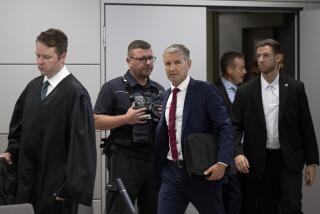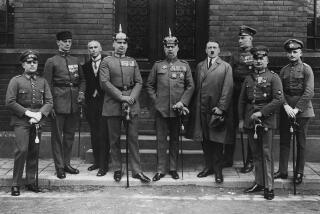Honecker Back in Berlin, May Go on Trial : Justice: The former Communist leader is returned from Moscow. Among the charges he faces are killings at the Berlin Wall.
- Share via
BERLIN — After 17 months in exile and a prolonged diplomatic tug-of-war, former East German Communist leader Erich Honecker was returned to Germany on Wednesday to face a variety of legal charges in connection with his role as head of one of the most repressive of Soviet Bloc regimes.
If he is judged physically fit to face any of the more than 75 charges filed against him, he will be one of the few Communist East European leaders to be formally tried in a democratic court for his actions.
Honecker, 79, arrived at Berlin’s Tegel Airport at twilight after a two-hour flight from Moscow, where he had spent the past 232 days under the diplomatic protection of the Chilean Embassy in a prolonged attempt to avoid being returned to Germany.
He had initially left Germany on a Soviet military plane provided by then-Soviet President Mikhail S. Gorbachev in March of last year in order to avoid arrest.
After landing Wednesday evening, he waited nearly 40 minutes inside the chartered Aeroflot aircraft, parked at a remote edge of the busy airport, before being taken by Mercedes-Benz limousine to the city’s main prison in the Moabit district.
At a news conference later, Jutta Limbach, head of the Berlin city Department of Justice, said Honecker was placed temporarily in a 100-square-foot prison hospital cell pending a full medical examination today. The results, she said, will determine whether he is transferred to a normal prison cell, remains in the prison hospital or is released on a form of parole in which he would be required to report daily to police until a trial date is set.
Additional medical exams will determine whether Honecker is fit to stand trial, Limbach said, adding that a trial is expected to begin before the end of this year. In recent years, Honecker has been in poor health. He reportedly underwent surgery for cancer in January, 1990, and was most recently treated for suspected cancer at a Moscow hospital last February.
Honecker’s return, although rumored for weeks, was sudden.
His departure from Moscow was shrouded in secrecy. As late as Wednesday afternoon, a Russian Foreign Ministry spokesman denied that any negotiations had occurred among the three nations involved--Russia, Chile and Germany.
After the first news bulletins were heard, German national radio and television quickly began near-saturation coverage, including live video transmission of the plane’s arrival in Berlin.
Hundreds of onlookers, many of them from the former Communist east, crowded the airport observation towers and lined the streets outside the Moabit prison and courthouse complex.
Many jeered, a few cried, “Murderer, murderer!,” but most were quiet.
“I heard it on the radio and came because I wanted to see him come back,” commented Sylvio Torquante, a 27-year-old professional driver who was jailed by the Honecker government and eventually fled to the West in 1985. “He needs to be charged.”
Many onlookers said it was right for the government to press for Honecker’s return and to place him on trial, but others were not so sure.
“They should have left him in Moscow,” commented one of the security guards on duty at the airport. “The trial is only going to cost more money.”
Those German political figures who pressed hardest for Honecker’s return, including Chancellor Helmut Kohl, made no immediate comment.
By taking Honecker into custody, the Kohl government hopes to deflect criticism that in pursuing wrongdoing in the former East Germany, it has punished only minor figures, while letting key people remain at large.
Foreign Minister Klaus Kinkel, who pursued Honecker much of last year in his previous capacity as German justice minister, said the former East German leader would be treated as a normal criminal suspect and is “assumed to be not guilty until proven otherwise.”
Honecker’s main defense lawyer, Friedrich Wolff, denounced the list of charges as “a political document that shows this is a political trial against him.”
Of all the Soviet Union’s East European satellite states, none was more doctrinaire or efficiently repressive than Honecker’s East Germany.
His Ministry for State Security had an army of informants that some estimated to number a million. The ministry, known as the Stasi, kept files on roughly one-third of the East German population.
But it was the infamous Berlin Wall, with its barbed wire, its heavily mined “death strip” and patrols of armed soldiers with orders to shoot anyone trying to flee the country, that set Honecker and East Germany apart from other East Bloc nations.
As the Politburo member responsible for state security, he directly supervised construction of the wall, which went up in August, 1961. As party leader and head of state after the death of Walter Ulbricht a decade later, Honecker carried ultimate responsibility for the policy of shooting those attempting to flee that was carried out along his country’s western border with West Germany.
Since the fall of Honecker’s regime in October, 1989, the number of East Germans known to have died trying to escape has risen from 187 to around 350 as new cases come to light that Communist authorities had suppressed.
The majority of charges against him stem from deaths or injuries either at the Berlin Wall or along the similarly fortified inner-German frontier that for the better part of four decades formed the heart of Europe’s Iron Curtain.
He faces 49 counts of manslaughter and 25 counts of attempted manslaughter, in addition to charges of abuse of power, embezzlement and the use of government funds for personal use.
Within a month of the fall of the Berlin Wall, Honecker was charged with criminal activity, but he avoided arrest. After taking refuge at the home of a Protestant pastor near Berlin for two months in early 1990, Honecker was eventually transferred to a Soviet military hospital in Beelitz south of Berlin, where he remained until his flight to Moscow in March, 1991.
While Gorbachev was apparently willing to protect a former fellow Communist leader, his successor, Boris N. Yeltsin, was not, and last December, Honecker took refuge in the Chilean Embassy.
Times staff writers Elizabeth Shogren in Moscow, William R. Long in Santiago, Chile, and Tamara Jones in Bonn contributed to this article.
More to Read
Sign up for Essential California
The most important California stories and recommendations in your inbox every morning.
You may occasionally receive promotional content from the Los Angeles Times.












